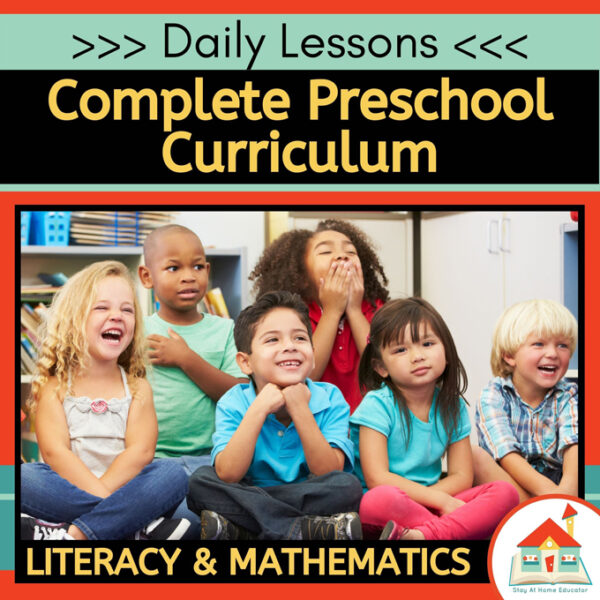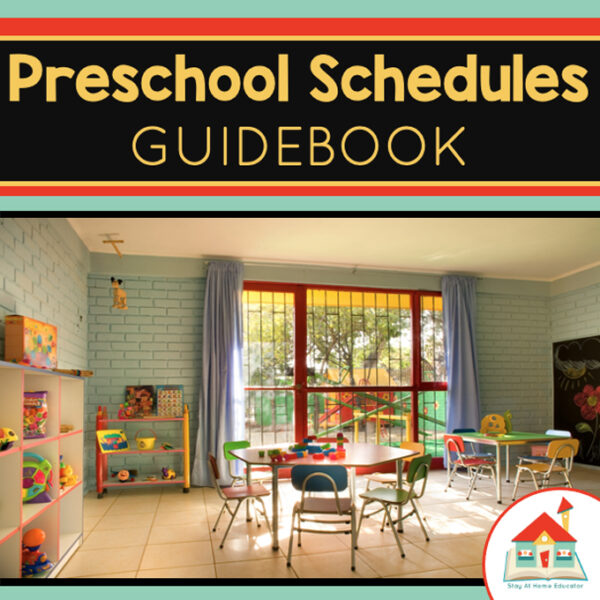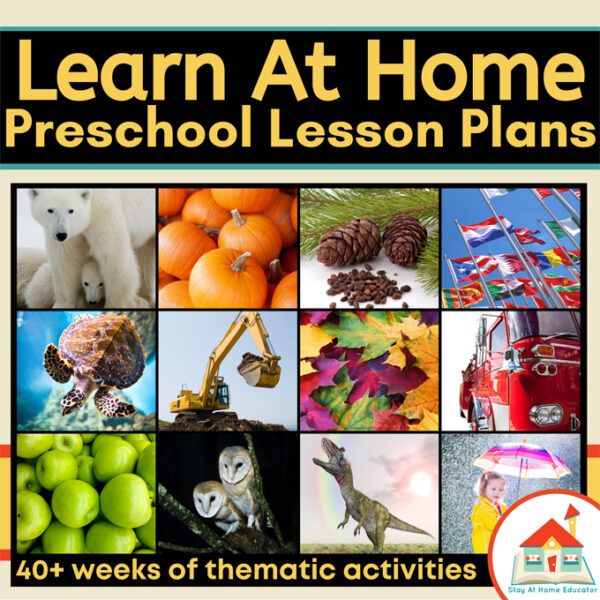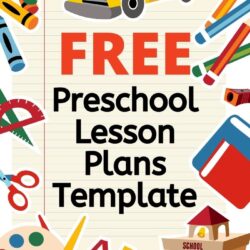If you are looking for ideas to help you streamline your preschool planning, you’ve come to the right place! Our FREE preschool lesson plan template written out in this post will help you plan with ease and confidence, with just a few easy steps.
Whether you prefer to plan day by day, a week at a time, or the whole year at once, having a plan helps keep your lessons focused and intentional on what your students need.
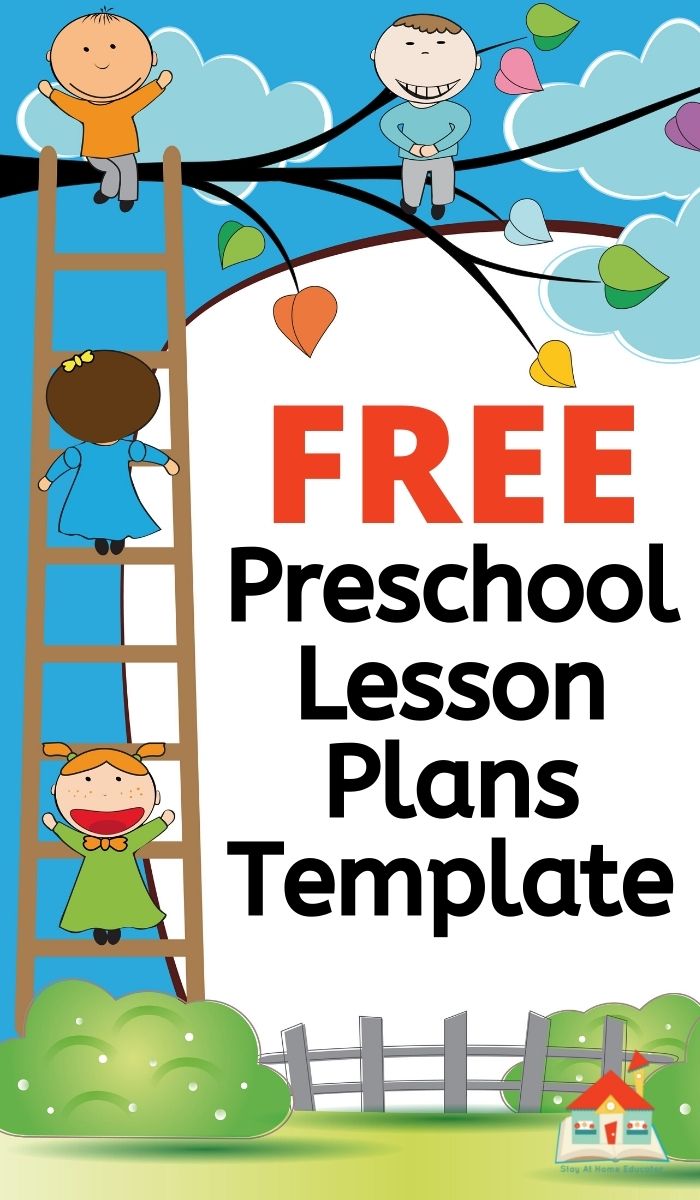
There are many ways to go about writing preschool lesson plans, and chances are that any preschool teacher will try out a few different approaches before settling on one.
Lesson planning can be time-consuming, so finding an approach that works is important because children’s education depends on well-thought-out lesson plans with excellent execution.
Whether you use weekly planning, monthly plans, or unit-based focus, having a developmentally appropriate scope and sequence that was carefully developed is a valuable tool to help keep you and your students on track.
A scope and sequence is a list of monthly goals and objectives that build upon one another to ensure you reach the big goals by the end of the school year.
If you are looking for preschool lesson plans that have been carefully crafted, vetted, and well-loved, check out our very own Preschool Curriculum. It has everything you need to teach your preschoolers literacy and math in a fun and engaging way, without all the boring worksheets!
What do Kids Learn in Preschool?
In preschool, children learn a broad range of skills that lay the foundation for their future academic and social development.
They are introduced to basic literacy and numeracy concepts, such as recognizing letters and numbers. They also start developing their fine motor skills through activities like drawing, painting, and cutting with scissors.
Beyond academics, preschool is a crucial time for children to develop social and emotional skills. They learn to interact with peers, share, take turns, and express their feelings in appropriate ways.
Because there is so much to learn during the formative preschool years, it’s important to have a solid plan for what and when to teach specific skills.
What is a Lesson Plan for Preschool?
A lesson plan is just that – a plan for what concept will be taught and how learning goals will be met. It should be fun, engaging, and developmentally appropriate.
A preschool lesson plans should outline clear objectives that align with early learning standards and include a variety of activities to cater to different learning styles.
The activities should be hands-on and interactive, encouraging children to explore and learn through play.
How to Make a Good Lesson Plan
A good lesson plan will also incorporate time for both guided play based instruction and independent exploration.
It should include a balance of academic learning – such as basic math and literacy skills – along with social and emotional learning.
Lastly, a preschool lesson plan should be flexible, allowing for spontaneous teachable moments and adaptation to the needs and interests of the children.

Here is a comprehensive guide on how to lesson plan for pre-k, too.
How to Write a Lesson Plan for Preschool
The initial phase of creating a lesson plan involves selecting a planning structure. For novice teachers, adhering to a pre-established format can provide significant needed structure and can increase learning outcomes in the classroom.
A preschool lesson plan should always include:
- learning objectives or goals
- materials needed to execute activities
- ideas for assessing learning
As you gain more expertise in drafting lesson plans, you may opt to design your own lesson plan format or adjust an existing template to better accommodate your requirements and those of your classroom.
Lesson Plan Format for Preschool
There is a lot to consider when planning out your preschool day, week, month, or year.
Having a scope and sequence planned out will save you time and energy and ensure that your plans are guiding your students to build their skills and knowledge as the year progresses.
These five helpful preschool lesson planning tips are essential for knocking off some time as you plan smarter.
This is the exact process for creating a preschool lesson plan template that will become second nature to you.
1. Identify Purpose
If a lesson or activity is going to be included, it needs to have a specific purpose within the scope and sequence of skills. When choosing an activity to include in your lesson plans, ask yourself what skills it targets.
And remember that social and emotional skills, most often practiced through play, are of huge value to the development of preschoolers, and it’s beneficial to write down examples of how to help your preschoolers practice and resolve conflicts.
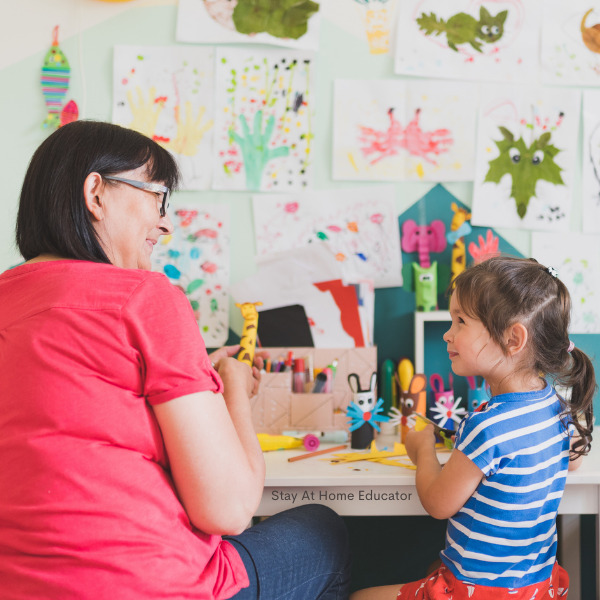
2. Keep Activities Simple
Chances are that if you have to write out preschool activities in paragraphs of details, you’ve chosen the wrong activity. Don’t underestimate the value of a simple activity.
Preschool activities that are simple and straightforward often prove to be more beneficial than those that are overly complex and intricate. The reason behind this is that young children are at a stage of development where they learn best through play and exploration.
Simple activities allow them to engage fully, experiment, and make discoveries on their own terms. They foster creativity, curiosity, and problem-solving skills.
3. Plan Around Student Interest
Let’s face it, if the children aren’t interested, the unit can be a wash and learning time can be lost.
When planning, choose preschool themes that are of high interest to the children in your class, and also consider how favorite activities can be incorporated into the theme, too.
Kids go crazy for a certain song or book? Consider transferring that into the next theme and ask for student input on projects, activities, and ideas.
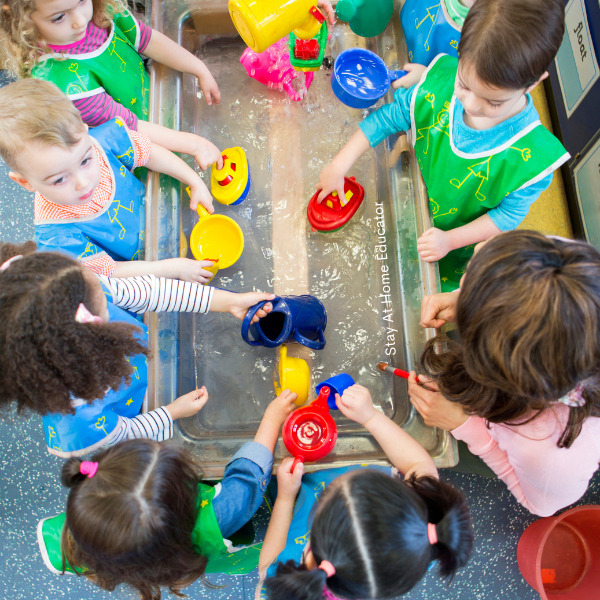
4. Choose an Approach
Play-based or skills-based? Teacher-directed or child-led? Or a mix of everything? You might even find that your approach will vary based on the objective.
The important thing to remember is to choose an approach that is appropriate and engaging for young learners.
No need to get weighed down with labels, just remember that preschoolers are full-body learners… they learn with their eyes (visual) and their ears (musically) as well as with their hands.
5. Write it Down
Use a lesson plan template for preschool to record your ideas for lessons. You can add as much or as little detail as you want, but be sure it gets written down, even if it is just a list.
Organizing yourself is a time-saver in the long run too! Not to mention, keeping an organized plan stores your most-loved activities and provides an opportunity to reflect the upcoming year for your next set of students.
A preschool lesson plan template is a must! It will put your day on autopilot.
Preschool Schedule Template
One of the easiest ways to find the perfect lesson plan template is to familiarize yourself with how your preschool schedule might impact lessons.
Snag our preschool schedules guidebook! It’s an 18-page e-book that’ll teach you everything you need to create a preschool schedule that will maximize student learning.
Free Preschool Curriculum Sample
If you want to see exactly what a preschool lesson plan looks like in literacy or math, then check out these resources.
Preschool Activity Plan Example
Sometimes, a list of activities will suffice, especially if you are a veteran teacher. Here are my best resources for preschool activity plans.

I’m Sarah, an educator turned stay-at-home-mama of five! I’m the owner and creator of Stay At Home Educator, a website about intentional teaching and purposeful learning in the early childhood years. I’ve taught a range of levels, from preschool to college and a little bit of everything in between. Right now my focus is teaching my children and running a preschool from my home. Credentials include: Bachelors in Art, Masters in Curriculum and Instruction.
